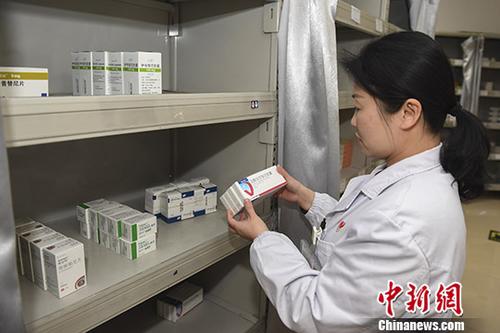Chinanews.com, January 28. According to the Chinese government website, the General Office of the State Council has recently issued the "Opinions on Promoting the Normalized and Institutionalized Development of Centralized and Volume Procurement of Drugs" (hereinafter referred to as the Opinions).
The opinions clarified the coverage of drugs for centralized drug purchases, focusing on including drugs with large amounts and high purchase amounts in the basic medical insurance drug catalog, and gradually covering all kinds of clinically necessary and reliable drugs on the domestic market, so as to meet the requirements. Take it all.
Data map: The doctor is taking medicine for the patient.
Photo by China News Agency reporter Yang Huafeng
Centralized procurement of drugs with volume is an important measure to coordinate the reform of the supply side of medical services.
In order to promote the normalization and institutionalization of centralized drug procurement, the General Office of the State Council put forward relevant opinions with the approval of the State Council.
The opinion puts forward overall requirements, mentioning the seven aspects of clarifying coverage, improving procurement rules, strengthening safeguard measures, improving supporting policies, improving operating mechanisms, and strengthening organizational guarantees.
The opinion clarified the coverage of centralized drug procurement, including drug coverage, enterprise coverage, and medical institution coverage.
In terms of the scope of medicines, in accordance with the principle of guaranteeing the basics and guaranteeing the clinics, we will focus on including the drugs with large amounts and high purchase prices in the basic medical insurance drug catalogs into the procurement scope, and gradually cover all kinds of clinically necessary and reliable drugs on the domestic market. It should be full.
Drugs that have passed (including deemed passing, the same below) generic drug quality and efficacy consistency evaluation (hereinafter referred to as consistency evaluation) are given priority to be included in the scope of procurement.
If the qualified drugs reach a certain quantity or amount, the centralized procurement will be initiated.
Actively explore suitable procurement methods for "orphan drugs" and shortage drugs to promote stable supply.
In terms of the scope of the enterprise, the holders of the marketing authorization who have obtained the drug registration certificate within the scope of centralized and volume procurement (if the holder of the drug marketing authorization is an overseas company, they shall be designated to perform the drug marketing authorization holders in accordance with the Pharmaceutical Administration Law of the People’s Republic of China Corporate legal persons in China with obligations), who meet the requirements of centralized procurement in terms of quality standards, production capacity, supply stability, etc., can participate in principle.
Enterprises participating in centralized procurement should make commitments to drug quality and supply guarantee.
In terms of the scope of medical institutions, all public medical institutions (including military medical institutions, the same below) should participate in centralized drug procurement, and medical insurance designated social medical institutions and designated pharmacies shall follow the management requirements of designated agreements.
Opinions put forward the need to improve the procurement rules.
Among them, the purchase amount must be reasonably determined.
The base number of drug purchases is verified based on the demand reported by medical institutions, combined with the previous year's use, clinical use status, and medical technology progress.
The agreed procurement ratio is reasonably determined according to the characteristics of the clinical use of drugs, the market competition pattern and the number of selected companies, etc., and should be increased as much as possible on the premise of ensuring quality and supply and preventing monopoly.
The opinions also mentioned the need to improve supporting policies, including improving settlement methods, coordinating the selected price and medical insurance payment standards, and improving the incentive mechanism for medical institutions.
In terms of improving the incentive mechanism for medical institutions, the medical insurance funds saved due to centralized procurement will be given incentives for the retention of medical institutions in accordance with relevant regulations.
In the case that centralized procurement covers a large variety of drugs, a large amount of money, and a large number of medical institutions involved, it is necessary to carry out dynamic adjustment and evaluation of medical service prices, and adjust the prices of medical services in a timely manner if conditions are met.
Designated medical institutions should improve internal assessment methods and remuneration mechanisms, promote the rational use of drugs by clinicians and pharmacists, and encourage preferential use of selected products.

